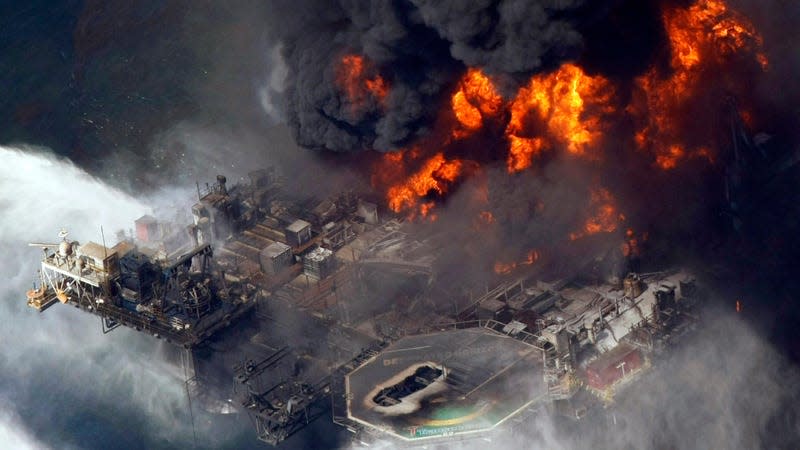Hackers Could Cause Next Deepwater Horizon-Level Disaster

The network of offshore oil and gas facilities in the U.S. is at serious and increasing risk of a potentially devastating cyberattack, a government watchdog says. The Government Accountability Office (GAO) released a new report last week finding that if a cyberattack successfully hits the nation’s offshore infrastructure, it could cause a catastrophe with impacts similar to those of the Deepwater Horizon disaster.
According to the GAO, there are currently more than 1,600 structures on the outer continental shelves involved in oil and gas production dotting the Atlantic, Pacific, and Alaskan coasts, as well as the Gulf of Mexico. Those structures are overwhelmingly reliant on operational technology that is controlled remotely. These systems, the GAO found, are particularly vulnerable to being hacked or otherwise breached by bad-faith actors, especially older systems that have fewer security measures in place. What’s more, previous government efforts to beef up the industry’s cybersecurity have resulted in little action.
Read more
“Absent the immediate development and implementation of an appropriate strategy, offshore oil and gas infrastructure will continue to remain at significant risk,” the GAO stated in the report.
Last year, the security of oil and gas infrastructure was thrown into the national spotlight after hackers with the group DarkSide breached the systems of the Colonial Pipeline, the biggest gasoline pipeline in the cUnited States. The attack prompted the pipeline to shut down for nearly a week, spurring a small gas panic on the East Coast, and was the largest breach of critical infrastructure in U.S. history. The hack was especially embarrassing given that the leak was a result of a single compromised password, and a tech audit conducted three years before the breach found that Colonial’s system could have been hacked by “an eighth-grader,” one of the auditors later told AP. The attack prompted a larger reckoning over the security of oil and gas systems—as well as the federal government’s lax attitude towards those systems.
The nation’s network of offshore oil and gas facilities and infrastructure is regulated by the Bureau of Safety and Environmental Enforcement (BSEE). In a wide-ranging review of BSEE policies, which include reviews of reports of what happened during previous operational technology failures on oil and gas facilities as well as interviews with federal employees and industry stakeholders, the GAO found that oil and gas operations are increasingly moving to remote work and “unmanned oil and gas production is becoming increasingly common.” At the same time, many operational technology systems are outdated or connect to larger business and IT systems within a company that can be accessed remotely.
Bad actors—like other nations, transnational criminal groups, or hackers—can increasingly access systems like these through the business end, the report states, and they can migrate those attacks more easily to the platforms and drilling infrastructure themselves. While the BSEE has made two efforts in 2015 and 2020 to address cybersecurity in drilling infrastructure, the report notes that “neither resulted in substantial action.”
As far as we know, there hasn’t yet been a deliberate attack on a U.S. oil and gas drilling technology network by a malicious actor, officials told the GAO. But we have seen what the failure of an operational technology system can look like—and how devastating it can be. The failure of an automatic safety system was part of the cascade of issues that led to the 2010 Deepwater Horizon explosion, the biggest oil spill in U.S. history that killed 11 people.
“Threat actors are becoming increasingly capable of carrying out attacks on critical infrastructure, including offshore oil and gas infrastructure,” the report finds. “At the same time, the infrastructure is becoming more vulnerable to attacks. More specifically, the [operational technology] in oil and gas infrastructure is increasingly vulnerable to being exploited in cyberattacks that could result in serious harm to human safety, the environment, and the economy.”
More from Gizmodo
The Best Shortcuts On Mac: Snap Windows, Text to Speech, and More
How to Delete Your Twitter Account If Elon Musk Was Your Last Straw
Sign up for Gizmodo's Newsletter. For the latest news, Facebook, Twitter and Instagram.

